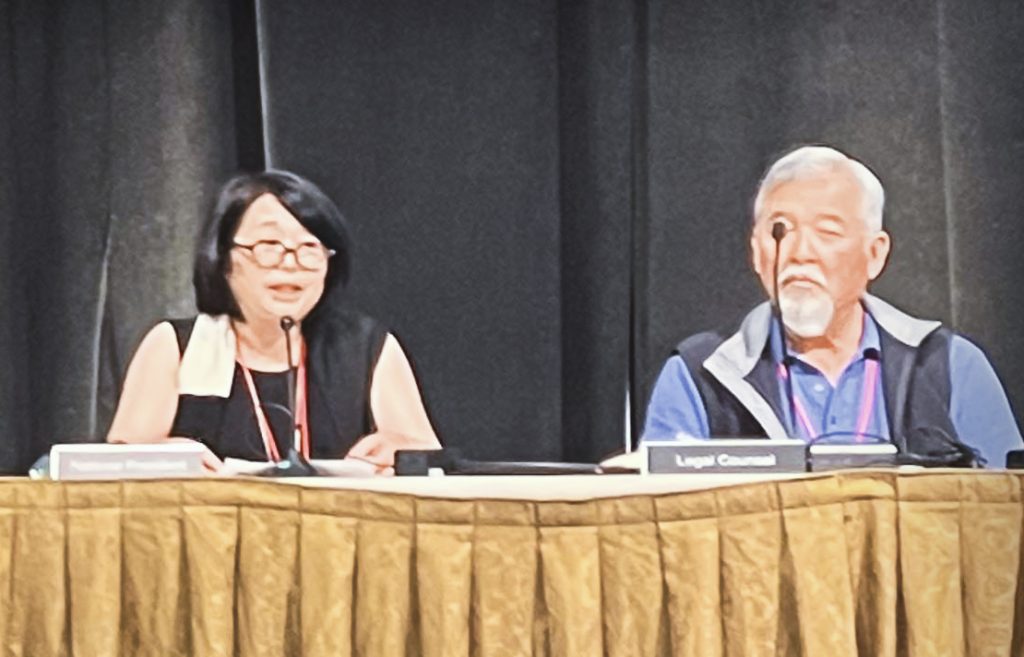By P.C. Staff
What happens when school leaders misunderstand history? According to Ron Kuramoto, president of the Wisconsin JACL chapter, that is exactly what happened recently when the Muskego-Norway School Board failed to approve Julie Otsuka’s award-winning historical fiction novel “When the Emperor Was Divine” for inclusion in its high school curriculum.

Julie Otsuka’s book “When the Emperor Was Divine” was among the topics discussed during the special panel. (Photo: Robert Bessoir)
Already in use in dozens of school districts across the country, the 2002 novel follows a Japanese American family’s struggles during the wartime incarceration. And yet, members of the Muskego-Norway School Board rejected Otsuka’s book because it lacked the U.S. government perspective on the incarceration.
This incident was the topic of a special session at the 2022 JACL National Convention on Aug. 6. Executive Director David Inoue opened the session with remarks on the national importance of JACL’s education efforts, including the recently concluded Teacher Training Workshop, held in Los Angeles’ Little Tokyo in partnership with the National Endowment of the Humanities.
The special session on education issues featured two speakers, Kuramoto and Dr. Emily Murase of the San Francisco JACL chapter who, in 2010, became the first Japanese American to serve on the San Francisco Board of Education.
Murase recounted the sordid history of the San Francisco School Board which, in 1906, excluded Japanese, Korean and Chinese students from attending regular public schools, segregating them, instead, to a single “Oriental School.” This patently racist policy caused an international crisis in U.S.-Japan relations.
As School Board president, Murase authored a successful resolution to officially remove the 1906 policy from the agency’s books. However, the fight continues still to this day, this time in Wisconsin. Kuramoto explained that the 77-year-old Wisconsin JACL chapter is a part of the AAPI Coalition of Wisconsin, which held a teach-in immediately before a July 18 school board meeting.
The teach-in featured keynote remarks by Kabby Hong, a California native born to Korean immigrants, who has had a distinguished teaching career for more than 20 years and was named 2022 Wisconsin Teacher of the Year. He urged that the school board respect the judgment of its teachers, reverse its position, and include the book in its curriculum.

Emily Murase and Ron Kuramoto led a discussion centered around the importance of highlighting education as part of JACL’s overall mission during the organization’s National Council session on Aug. 6. (Photo: Courtesy of Emily Murase)
At the teach-in, Hong explained: “I never saw myself as a hero in any book that I ever read [growing up]. Never saw anyone that looked like me achieve anything in history. And when I looked at the TV shows and movies when I grew up, I saw nothing but cringe-worthy stereotypes. It wasn’t until I was a 40-year-old man … that I realized that Asian Americans have deep roots in this country, that Asian Americans have a record of achievements in every aspect of our society. Let’s not do that to our future generations!”
To emphasize its point, the AAPI Coalition distributed 100 copies of Otsuka’s book, purchased at local booksellers, at the teach-in and plans to do much more to challenge, and reverse, the school board’s decision.
In closing her remarks, Murase acknowledged the work of late-legendary JACL National Education Committee member Greg Marutani of the San Francisco chapter: “When I was on the school board, Greg would regularly propose new ways to expand education about the Japanese American experience in San Francisco public schools. As chapter president, Greg raised funds to donate copies of Kathryn Otoshi’s anti-bullying picture books to every elementary school.”
Murase continued, “I also want to acknowledge the work of the National JACL Education Committee, members past and present, including my late-father-in-law, Izumi Taniguchi of the Fresno chapter, longtime committee member and past chair Carol Kawamoto, as well as Dr. Sharon Ishii-Jordan, who worked closely with Greg to deliver workshops across the country. This is what the JACL budget is funding, and I personally consider investing in the JACL education program and, in particular, the Teacher Training Program, as among the most impactful ways we influence the broader communities.”
Following the presentations, JACL chapter members shared their experiences in their home communities. New Mexico chapter members conducted a symposium with teachers in Santa Fe. The Twin Cities chapter worked to bring the Smithsonian exhibit on the Japanese American experience to the Minnesota History Museum. JACLers from Illinois and Colorado also shared their efforts.
Inoue closed the session by emphasizing the importance of local chapter efforts to advocate for inclusive curriculum and cultivate working relationships with school board members and other local officials. He explained that the goal of the JACL’s Centennial Education Fund, launched in part by the late-Sec. Norman Mineta to raise $3 million by 2024, is to sustain JACL’s mission of education. To date, it has raised $1.3 million.



